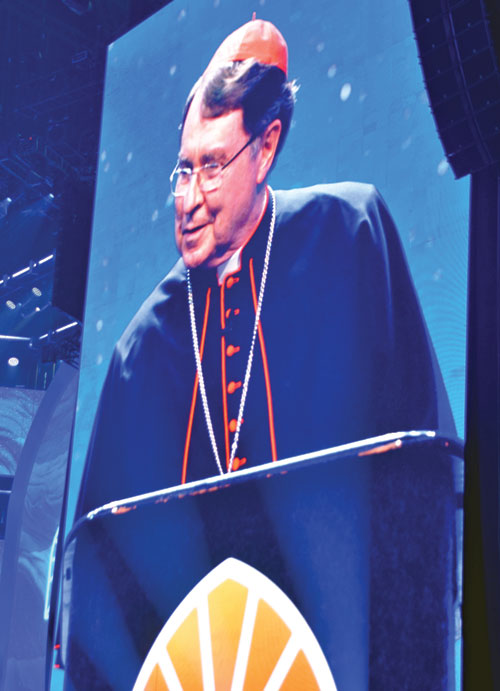Encountering Christ in the Eucharist leads to encountering him in others, says papal nuncio

An image of United States papal nuncio Cardinal Christophe Pierre is projected on a large screen as he speaks on July 17 in Lucas Oil Stadium in Indianapolis during the first evening revival session of the National Eucharistic Congress. (Photo by Natalie Hoefer)
By Natalie Hoefer
Four days into the National Eucharistic Congress, 10-year-old Samuel Sargeant still cites a moment during the opening night of the Congress on July 17 as his favorite.
“It was when all the lights came down on the monstrance” in Lucas Oil Stadium, said the young Catholic from Vandalia, Ohio.
Prior to that moment, the tens of thousands present in the stadium knelt as a beam of light followed a massive, gleaming monstrance with the Blessed Sacrament, carried by Bishop Andrew H. Cozzens of Crookston, Minn., as he processed with it toward an altar at the center of the arena floor.
After placing the monstrance with the Blessed Sacrament on the altar, he knelt before it.
Then came Samuel’s favorite moment: In unison, lights around the dimly lit arena trained their beams on the Blessed Sacrament.
There they remained as Bishop Cozzens prayed aloud for Christ’s blessing on the Congress, a renewal in hearts for love of Jesus’ true presence in the Eucharist, and the grace for the faithful to become missionary disciples of Christ’s love in the world.
It was a powerful and fitting start to the congress held in Indianapolis, the first national congress in 83 years.
Minutes before that poignant moment, Archbishop Charles C. Thompson welcomed those present in a recorded video message.
“We are immensely blessed to have the 10th National Eucharistic Congress unfolding on Hoosier soil,” he said. “I also welcome those who are joining us virtually, as well as Cardinal [Christophe] Pierre and Cardinal [Luis A.] Tagle, who represent the closeness of our Holy Father, Pope Francis.
“I pray that God will move all our hearts through this monumental opportunity to encounter Christ and his Church.”
After Benediction, U.S. apostolic nuncio Cardinal Pierre explored the topic of what a eucharistic revival is.
“We know that such revival, while it is always accompanied by sacramental devotion, must extend beyond devotional practices as well,” he said. “When we are truly revived by the Eucharist, then our encounter with Christ’s real presence in the sacrament opens us to an encounter with him in the rest of our life. This means seeing him everywhere we go. It means meeting him in the interactions we have with others,” like family and friends.
It also means encountering Christ “with people from whom we would rather consider ourselves divided,” said Cardinal Pierre. “This might include people from a different economic class or race, people who challenge our way of thinking, people whose perspective is informed by experiences that differ greatly from our own.”
Encountering Christ begins with a relationship with him, the cardinal said. That relationship is developed in adoration.
“The Latin word for adoration is adoratio, mouth-to-mouth contact, a kiss, an embrace, and hence, ultimately, love,” he explained.
The relationship built with Christ in adoration “spills over in our daily life, our life of relating to others, our way of seeing others,” Cardinal Pierre continued. “When we are truly revived, transformed by the Eucharist, we do not remain the same as we were. We begin to see differently. We see with the eyes of Christ.”
Those eyes of Christ behold each of us with love, said Sister of Life Bethany Madonna, the evening’s second speaker.
“When you love someone, you prove it,” she said. “God proves his love for us in a thousand ways,” especially through his death on the cross for our salvation and by giving himself—body, blood, soul and divinity—to us in the Eucharist, she continued.
“Simply to be, to exist, is to be loved. ... God loved you and willed you into being. You are totally unique, unrepeatable, irreplaceable. … Our worth is not in what we do. It’s not in money or talents or education or status. We’re lovable because we are.” †
(See all of our coverage of the National Eucharistic Congress at www.archindy.org/congress.)
